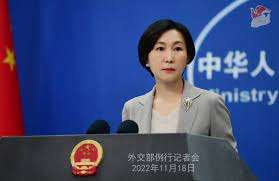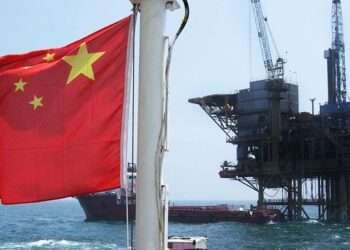China’s government on Thursday, March 9, 2023, criticized the Netherlands for joining Washington in blocking Chinese access to technology used to manufacture advanced processor chips on security and human rights grounds.
Dutch Minister for Foreign Trade and Development Cooperation, Liesje Schreinemacher disclosed to lawmakers on Wednesday, March 8, 2023 that exports of equipment that uses ultraviolet light to etch circuits on chips would be restricted on security grounds.
Industry experts claim that a lack of access to ASML’s most advanced technology is a serious impediment for China’s efforts to develop its own chip industry.
Liesje Schreinemacher sent a letter to lawmakers outlining the proposed limitations, which come in addition to existing export controls on semiconductor technology.
“In view of technological developments and geopolitical context, the government has come to the conclusion that it is necessary for (inter)national security to extend the existing export control of specific semiconductor production equipment.”
Liesje Schreinemacher, Dutch Minister for Foreign Trade and Development Cooperation
The letter added that the new export control measures target “very specific technologies in the semiconductor production cycle on which the Netherlands has a unique and leading position, such as the most advanced Deep Ultra Violet (DUV) immersion lithography and deposition.”
Also, it noted that the decision for additional export controls “was made carefully and as precisely as possible (surgically), in order to avoid unnecessary disruption of the value chains and to take into account the international level playing field.”
The government said it would publish the new regulations “before the summer.”
In October, 2022, Washington blocked Chinese access to U.S. tools to make advanced chips that it said might be used in weapons or in equipment for the ruling Communist Party’s surveillance apparatus.
Currently, the Biden administration is lobbying European and Asian allies to tighten their own controls.
Chinese Foreign Ministry Spokesperson, Mao Ning complained that “an individual country,” a reference to the United States, was trying to “safeguard its own hegemony” by abusing national security as an excuse to “deprive China of its right to development.”
“We firmly oppose the Netherlands’s interference and restriction with administrative means of normal economic and trade exchanges between Chinese and Dutch enterprises.” Mao Ning, Chinese Foreign Ministry Spokesperson
“We have made complaints to the Dutch side,” Mao Ning iterated.
China Urges Netherlands To Safeguard International Supply Chain

Mao Ning also appealed to the Netherlands to “safeguard the stability of the international industrial and supply chain.”
ASML’s extreme-ultraviolet, or EUV, equipment uses light to etch microscopically precise circuits into silicon, allowing them to be packed more closely together.
That increases their speed and reduces power demand.
The Dutch government has prohibited ASML from exporting its most advanced machines to China since 2019, but the company is allowed to supply lower-quality systems.
Chinese manufacturers can produce low-end chips used in autos and most consumer electronics but not those used in smartphones, servers and other high-end products.
Dutch Prime Minister, Mark Rutte and U.S. President Joe Biden had discussions in January on ASML’s chip machines.
U.S. officials claim that China is spending heavily to develop its fledgling semiconductor producers but so far cannot make the high-end chips used in the most advanced smartphones and other devices.
ASML, which is headquartered in the southern Dutch town of Veldhoven, is the world’s only producer of machines that use extreme ultraviolet lithography to make advanced semiconductor chips.
ASML has research and manufacturing centers in Beijing and Shenzhen, China, as well as a regional headquarters in Hong Kong.
READ ALSO: Freedom Hinged On Unseen Chains






















